Alpheus Hyatt Verrill
Alpheus Hyatt Verrill, known as Hyatt Verrill, (23 July 1871 – 14 November 1954) was an American zoologist, explorer, inventor, illustrator and author. He was the son of Addison Emery Verrill, the first professor of zoology at Yale University.
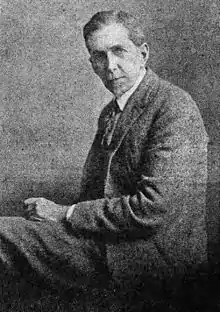
He authored many books on natural history and science fiction works.
Biography
Hyatt Verrill was born at New Haven, Connecticut.
He wrote on a wide variety of topics, including natural history, travel, radio and whaling. He participated in a number of archaeological expeditions to the West Indies, South, and Central America. He travelled extensively throughout the West Indies, and all of the Americas, North, Central and South. Theodore Roosevelt stated: "It was my friend Verrill here, who really put the West Indies on the map.”
During 1896, he served as natural history editor of Webster's International Dictionary, and he illustrated many of his own writings as well. In 1902, Verrill invented the autochrome process of natural-color photography.
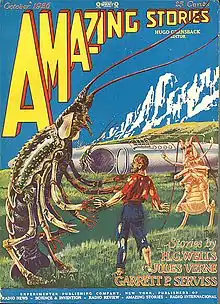
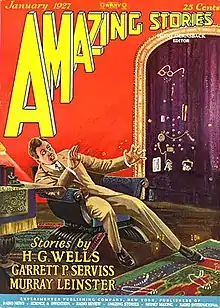
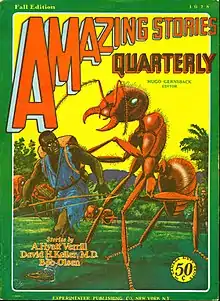
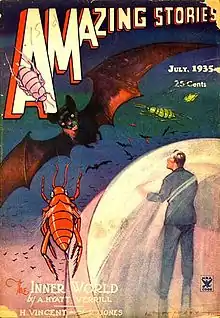
Among his writings are many science fiction works including twenty six published in Amazing Stories pulp magazines. Upon his death, P. Schuyler Miller noted that Verrill "was one of the most prolific and successful writers of our time," with 115 books to his credit as well as "articles in innumerable newspapers."[1] Everett F. Bleiler described Verrill's "lost race" stories as "more literate than most of their competition, but stodgy."[2]
When the Moon Ran Wild (1962) was published posthumously using the name Ray Ainsbury.
Reception
Verill's books were praised for their entertaining writing style but were criticized by biologist Joel Hedgpeth for containing "outrageous fabrications" to appeal to younger readers.[3] Geneticist H. Bentley Glass wrote that Verill had written a number of entertaining works but his Strange Prehistoric Animals and Their Stories was riddled with errors and what passed as fact in the book was "hardly distinguishable" from fiction.[4]
Lionel Walford, a marine biologist, wrote in a review for Verrill's Wonder Creatures of the Sea that the literary quality is "nullified by its lack of scientific dependability".[5]
Other reviews were entirely positive.[6][7] For example, his Harper's Book for Young Naturalists was described as factually reliable and a "valuable hand-book for the library of home or school".[8]
Bibliography
Non-fiction
- A-B-C of Automobile Driving (1916)
- Along New England Shores (1936)
- America's Ancient Civilizations (with Ruth Verrill) (1953)
- The Book of the West Indies (1917, 1919)
- The Book of the Sailboat: How to rig, sail and handle small boats (1916)
- The Boy Collector's Handbook (1915)
- The Boy's Book of Buccaneeers (1927)
- The Boy's Book of Whalers (1927)
- Cuba Past and Present (1928)
- Foods America Gave the World (1945)
- Getting Together with Latin America (1918)
- Great conquerors of South and Central America (1943)
- Harper's Aircraft Book (1913)
- Harper's Book for Young Gardeners (1914)
- Harper's Book for Young Naturalists
- Harper's Gasoline Engine Book (1914)
- Harper's Wireless Book (1913)
- The Heart of Old New England (1936)
- The Home Radio: How to Use and Make It (1922)
- The Incas' Treasure Cove (1932)
- The Inquisition (1931)
- Islands and Their Mysteries
- Islands of Spice and Palm (1915)
- Jamaica of Today (1931)
- Verrill, Alpheus Hyatt (1917). Knots, Splices and Rope Work. Norman W. Henley Publishing.
- Lost Treasure: True Tales of Hidden Hoards (1930)
- Minerals, Metals and Gems (1939)
- My Jungle Trails (1937, 1941)
- The Ocean and Its Mysteries (1917)
- Perfumes and Spices (1940)
- Precious Stones and Their Stories
- The Real Story of the Whaler: Whaling Past and Present (1916)
- Rivers and Their Mysteries
- Romantic and Historic Virginia (1935)
- Romantic and Historic Florida (1935)
- Secret Treasure: Hidden Riches of the British Isles (1931)
- Shell Collector's Handbook (1950)
- Strange Animals and Their Stories (1939)
- Strange Birds and Their Stories (1938)
- Strange Creatures of the Sea (1955, 1959)
- Strange Customs, Manners and Beliefs (1946, 1969)
- Strange Fish and Their Stories (1938, 1948)
- Strange Insects and Their Stories (1938)
- Strange Monsters and Their Stories
- Strange Prehistoric Animals and Their Stories (1948)
- Strange Reptiles and Their Stories (1937)
- Strange Sea Shells and Their Stories (1950 [but listed in the 1938 edition of "Strange Birds"])
- The Strange Story of Our Earth: A Panorama of the Growth of Our Planet as Revealed by the Sciences of Geology and Paleontology (1962)
- They Found Gold; True Stories of Successful Treasure Hunts
- Thirty Years in the Jungle (1929)
- Under Peruvian Skies (1930?)
- West Indies of Today (1931, 1937)
- Wonder Creatures of the Sea (1940)
- Wonder Plants and Plant Wonders (1939)
- The Young Collector's Handbook (1948)
- Never a Dull Moment: The Autobiography of A. Hyatt Verill (2008)
Fiction
- Beyond the Pole, Amazing Stories (October 1926)
- The Man Who Could Vanish, Amazing Stories (January 1927)
- Plague of the Living Dead, Amazing Stories (April 1927)
- The Voice from the Inner World (1927)
- The World of the Giant Ants, Amazing Stories Quarterly (Fall 1928) reprinted by Armchair Fiction
- Into the Green Prism, Amazing Stories (1929) reprinted by Armchair Fiction
- Beyond the Green Prism, Amazing Stories (1930) reprinted by Armchair Fiction
- The Bridge of Light, Amazing Stories Quarterly (Fall 1929)
- The Inner World, Amazing Stories (July 1935)
- When the Moon Ran Wild (1962)
References
- "The Reference Library", Astounding Science Fiction, March 1955, p.152
- Bleiler, Everett Franklin; Bleiler, Richard (1990). Science Fiction, the Early Years. Kent State University Press. p. 772. ISBN 0-87338-416-4.
- Hedgpeth, Joel W. (1956). Reviewed Work: Strange Creatures of the Sea. The Quarterly Review of Biology 31 (1): 42.
- Glass, Bentley. (1949). Reviewed Work: Strange Prehistoric Animals and Their Stories. The Quarterly Review of Biology 24 (2): 146.
- Walford, L. A. (1940). Wonder Creatures of the Sea. Copeia 1940 (3): 209.
- Ackerknecht, Erwin H. (1946). Reviewed Work: Strange Customs, Manners and Beliefs. The Quarterly Review of Biology 21 (4): 421.
- Smith, Ella Thea. (1953). Reviewed Work: The Strange Story of Our Earth: A Panorama of the Growth of Our Planet as Revealed by the Sciences of Geology and Paleontology. The Quarterly Review of Biology 28 (1): 41.
- Anonymous. (1914). Reviewed Work: Harper's Book for Young Naturalists. The Sewanee Review 22 (2): 255.
Further reading
- Who Was Who in America, Vol 3: 1951-1960.
External links
- Biography
- Works by Alpheus Hyatt Verrill at Project Gutenberg
- Works by Alpheus Hyatt Verrill at Faded Page (Canada)
- Works by or about Alpheus Hyatt Verrill at Internet Archive
- Works by Alpheus Hyatt Verrill at LibriVox (public domain audiobooks)

- All of his science fiction stories, some full-length books and many of his articles are at http://stillwoods.blogspot.com
- A. Hyatt Verrill at the Internet Speculative Fiction Database